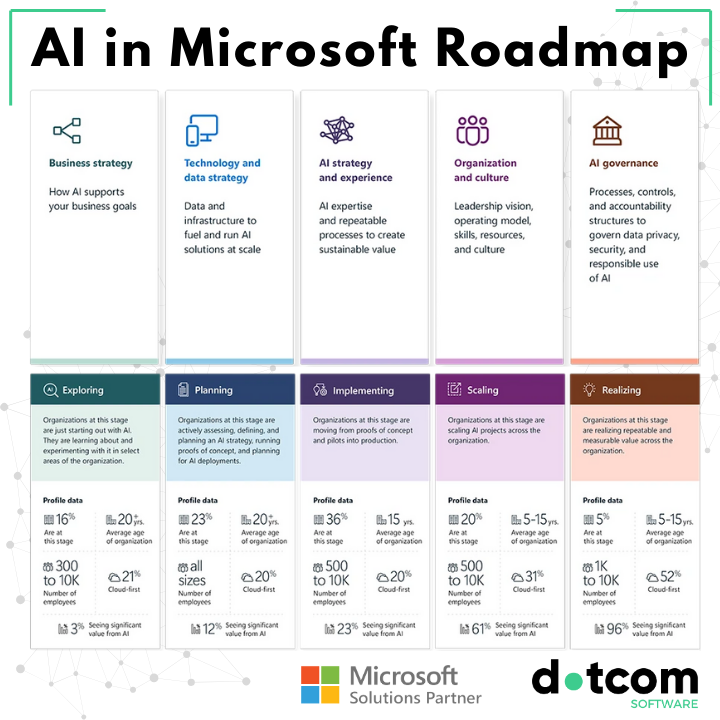


AI in Microsoft Roadmap: What CIOs & CDOs Must Prepare For
21st Aug, 2025
Microsoft is embedding artificial intelligence across its entire ecosystem, fundamentally reshaping how enterprises operate. As we progress through 2025, business leaders will face a critical inflexion point where AI transforms from an optional improvement to a strategic necessity.
The implications extend far beyond productivity gains.
Microsoft's aggressive AI integration across Copilot, Dynamics 365, Windows 11, and Power BI signals a paradigm shift where intelligent automation becomes the foundation of competitive advantage.
For CIOs and CDOs, this presents both unprecedented opportunities and complex challenges that demand immediate strategic attention.
AI In Microsoft 2025: Updates & Waves
Microsoft's 2025 roadmap reveals five transformative developments that will fundamentally alter enterprise technology landscapes.
1. Release Wave 1: AI Across Copilot, Dynamics 365, Power Platform
Microsoft's Release Wave 1, spanning April to September 2025, delivers comprehensive AI automation across core business platforms.
The rollout introduces improved CRM intelligence, intelligent SalesChat capabilities, and inline email drafting within Copilot for Service. These updates signal Copilot's evolution into vertical-aware, workflow-embedded productivity tools.
The strategic significance lies in role-based customisation. Copilot now adapts to specific business functions, delivering contextually relevant assistance that understands industry nuances and departmental requirements.
2. Built for Developers: Agentic AI & Copilot Tuning
At Build 2025, Microsoft unveiled agentic AI capabilities that transition from assistance to autonomous task execution. CTO Kevin Scott reported that AI agent usage has more than doubled year-over-year, highlighting rapid enterprise adoption.
Key developments include the Azure SRE agent integrated within GitHub Copilot and "Copilot Tuning" functionality that enables customisation using company-specific data.
This advancement accelerates enterprise automation while reducing implementation friction for AI-enhanced workflows.
3. Windows 11: Smarter, More Resilient, More Accessible
The August 2025 Windows security update introduces AI-driven enhancements across system management and user experience.
Notable additions include:
- Settings app featuring an AI agent for natural language system modifications on Copilot+ PCs.
- Enhanced Quick Machine Recovery for automatic boot issue diagnosis.
- Improved Windows Recall with comprehensive data export capabilities.
- "Click to Do" AI tools integrated with Microsoft Teams.
Earlier this year, Windows Insider builds added other features like AI-generated image descriptions, privacy indicators for AI use, and an AI assistant in Settings for faster troubleshooting.
These updates demonstrate Microsoft's commitment to making AI ubiquitous within the desktop environment.
4. A Vision Toward 2030: Agentic Desktop Interactions
Microsoft's "Windows 2030 Vision" outlines a future where computers engage in natural conversation, anticipating user needs through agentic AI desktops. This paradigm shift positions AI agents as digital colleagues capable of autonomously handling security protocols and routine tasks.
For strategic leaders, this vision provides a roadmap for long-term innovation planning to embrace this vision.
5. Radical AI Tooling: Fabric, Power BI, and Open Access
Power BI's May 2025 update introduces standalone "Ask Anything" AI functionality in preview mode, alongside translytical task flows for automation and tools for preparing semantic models for AI integration.
Microsoft Fabric's comprehensive roadmap encompasses Data Factory, Data Science, OneLake, and real-time intelligence capabilities, establishing a unified, AI-native data platform.
This consolidation eliminates traditional data silos while providing enterprises with scalable AI adoption pathways.
Why It Matters For You
Microsoft's AI integration creates five strategic imperatives that demand executive attention.
AI is Everywhere: Copilot's deep workflow integration requires adaptive enablement strategies. Organisations must develop comprehensive training programmes and governance frameworks to maximise AI productivity gains while maintaining operational control.
Agentic Transformation Is Happening: AI agents now execute tasks independently rather than merely providing assistance. Leaders must establish clear boundaries, trust protocols, and governance structures to harness autonomous AI capabilities safely and effectively.
You Need Resilient Infrastructure: AI-backed recovery and troubleshooting capabilities significantly reduce downtime while strengthening operational resilience. Infrastructure modernisation becomes essential for leveraging these protective capabilities.
Platform Unification Is The Way To Go: Microsoft Fabric's unified approach eliminates data fragmentation, creating foundations for scalable AI deployment. Organisations must align data strategies with this consolidated platform vision.
You Need To Implement Long-Term Visioning: The Windows 2030 vision requires strategic planning around device interaction evolution, policy development, and AI ethics frameworks. Early preparation provides competitive advantages in upcoming technological transitions.
Let Dotcom Software Help You Prepare
Dotcom Software's proven expertise in Microsoft solutions positions us to guide your AI transformation journey through five critical initiatives:
- Conduct an AI maturity assessment: Our team identifies strategic opportunities where Copilot, agentic AI, and Fabric capabilities can unlock competitive advantages specific to your industry and operational requirements.
- Pilot agentic workflows: We empower teams with customised Copilot agents tailored to department-specific tasks, ensuring seamless integration with existing processes while maximising productivity gains.
- Modernise infrastructure: We deploy Copilot+ devices strategically and leverage AI-enhanced recovery systems to boost your operational resilience and reduce system vulnerabilities.
- Unify data estates: We embrace Microsoft Fabric to standardise data pipelines and support enterprise-grade analytics, creating foundations for comprehensive AI adoption.
- Strategic planning: We can translate the Windows 2030 vision into actionable roadmaps covering user interface evolution, security enhancements, and comprehensive end-user training programmes.
Preparing for the AI-Driven Future
Microsoft's 2025 AI roadmap represents more than technological advancement; it signals a fundamental shift in how enterprises operate, compete, and deliver value. The organisations that proactively align their strategies with these developments will secure significant competitive advantages, while those that delay risk operational obsolescence.
Ready to transform your enterprise with AI?
Contact Dotcom Software today to begin your strategic AI transformation journey.

